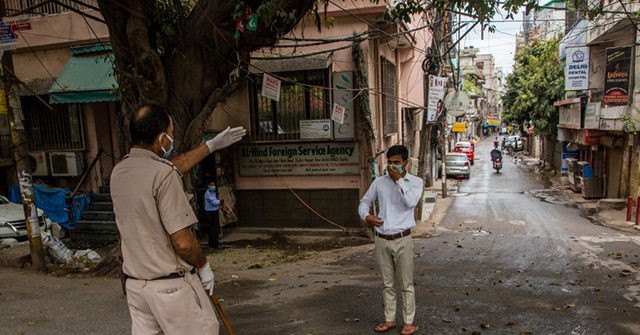
Videos of security forces beating quarantine violators with sticks and batons in India flooded social media this week. Indian Prime Minister Narendra Modi announced the total shutdown of India for 21 days on Tuesday night to curb the spread of the Chinese coronavirus in the nation of 1.3 billion people.
Beginning Wednesday, the world’s largest lockdown has already produced alarming reports of severe abuses of power, including the physical assault of citizens by police for violating the strict social distancing mandates.
LOCKDOWN CRACKDOWN: Indian police give unorthodox, sometimes violent summary punishments to people breaking the country’s lockdown rules. https://t.co/M2koswvkGv pic.twitter.com/xvLx2O8qw5
— ABC News (@ABC) March 26, 2020
Many of the victims in the footage appear to be walking to food markets to stock up on basic necessities needed during the lockdown. In other video clips circulated online, police officers are seen appearing to force people to perform squats, sit-ups, and push-ups.
During the lockdown, Modi banned all social, political, sports, entertainment, academic, cultural, and religious gatherings. He also suspended transport services including air, rail, and roadways. Under the order, people could face up to two years in jail and an unspecified financial penalty if they flout the rules, Modi said Tuesday.
India will soon likely participate in the World Health Organization’s (WHO) “solidarity trial” to develop potential drugs to combat the Chinese coronavirus, Indian health officials announced at a press briefing on Friday. India did not participate in the trial earlier because “our numbers were small and our contribution would have looked minuscule,” explained Raman R. Gangakhedkar, Head of Epidemiology and Communicable diseases at the Indian Council of Medical Research (ICMR).
After Modi announced the 21-day national lockdown on Tuesday, some questioned how Indians living in slums and other low-income areas would cope with the quarantine, which threatens not just their health but their livelihood. “[I]t’s going to be very hard on the poor and vulnerable,” said virologist Shahid Jameel of the shutdown on Tuesday.
Conditions in these poorer communities — including crowded quarters, weak public services, and informal labor — allow the Chinese coronavirus ample opportunity to spread. The economic risk to the poor compounds the crisis.
Many in India fear losing their jobs due to the lockdown. This concern has been voiced most recently in Brazil, another highly populous nation facing an impending Chinese coronavirus outbreak and subsequent quarantine. In Brazil, nearly 15 million people live in crowded, often unsanitary slums. According to one poll carried out across Brazil recently, 72 percent of slum residents said they had no income if they lost their source of livelihood.
At press time Friday, India had 887 cases of Chinese coronavirus and 20 deaths.
via Breitbart News
Enjoy this article? Read the full version at the authors website: https://www.breitbart.com
